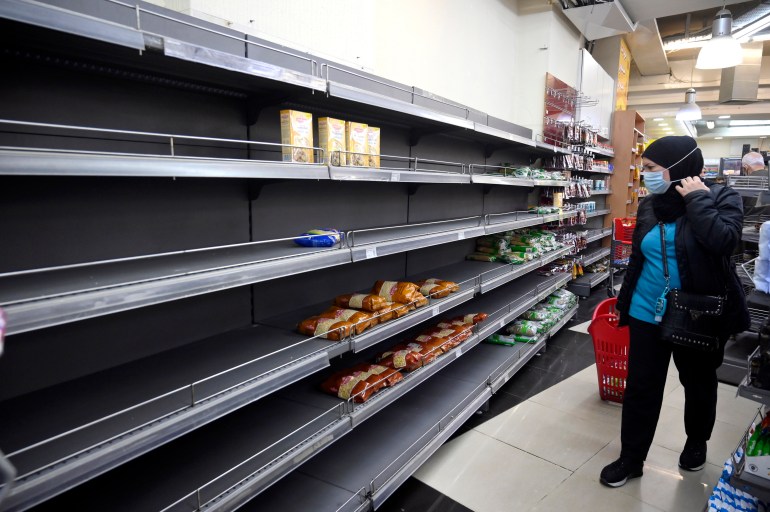EU adopts framework to sanction Lebanese officials
European Union says it is ready to impose sanctions on Lebanon’s ruling elite over the country’s political crisis.

Beirut, Lebanon – The European Union said it has adopted a legal framework to impose sanctions on Lebanese officials and entities engaged in corruption, the obstruction of government formation, and the stalling of economic and accountability reforms.
Lebanon has been without a full-fledged government in almost a year, following Prime Minister Hassan Diab’s resignation days after the devastating Beirut Port explosion.
Keep reading
list of 4 itemsNajib Mikati named Lebanon’s new prime minister-designate
Lebanon’s public ride-share drivers fear livelihood crash
Cash-strapped Lebanon signs fuel deal with Iraq to ease crisis
Listed Lebanese officials would be subject to an EU travel ban and asset freeze, while European entities and individuals are “forbidden from making funds available” to them, the EU said in a statement on Friday.
“The Union is ready to use all its policy instruments to contribute to a sustainable way out of the current crisis and to react to a further deterioration of democracy and the rule of law, and of the economic, social and humanitarian situation in Lebanon,” it said.
No names have been listed yet. An EU source told Al Jazeera that member states will enter a discussion phase to agree on names of Lebanese officials to be listed.
“It is difficult to assess how long it will take before they agree on the names,” the source, speaking on condition of anonymity, said.
The EU’s 27 member states must vote unanimously for the sanctions to be imposed.
France and the EU had hinted at using sanctions to push Lebanese authorities to restructure and recover Lebanon’s economy over the past year.
Most recently, the EU said two weeks ago it has been working on a sanctions framework for Lebanese officials, but said it would not be implemented immediately.

On Monday, billionaire businessman and ex-premier Najib Mikati was appointed as Lebanon’s new prime minister-designate and was tasked with forming a new government.
His appointment comes just 11 days after Future Movement leader Saad Hariri resigned as prime minister-designate, after a nine-month political deadlock with President Michel Aoun and his son-in-law politician Gebran Bassil.
The country is also facing an economic crisis described by the World Bank as among the worst in the world since the mid-19th century.
Half the population lives in poverty, while the Lebanese pound has lost at least 90 percent of its value in less than two years. Corruption and mismanagement of public funds is endemic.
French Foreign Minister Jean-Yves Le Drian said in late April that Paris had issued travel bans to Lebanese officials obstructing government formation, back when Hariri was caretaker prime minister, though no names were announced.
Less than two weeks later, Le Drian said French sanctions could get tougher as political deadlock persists and a reform plan Lebanese officials agreed with President Emanuel Macron almost a year ago remains stalled.
The United States has already issued sanctions against Lebanese officials over the past year, most notably ex-Public Works and Transportation Minister Yousef Finianos and ex-Finance Minister Ali Hasan Khalil for their close ties to Hezbollah and for allegedly engaging in corruption to strengthen the Iran-backed party.
Economic analyst Sami Zoughaib told Al Jazeera that he was “sceptical” that foreign sanctions on Lebanese officials would have a strong effect.
“This could be positive as long as it hits everyone and ostracises the political elite from the international arena – in the sense that they no longer have the bargaining power – but I am sceptical,” Zoughaib said.
“Each foreign power has its clients and allies here [among ruling political parties], but I feel they will want to target some people but not their people.”
President Aoun’s office declined to comment on Friday’s announcement, while caretaker Prime Minister Hassan Diab’s office did not respond to Al Jazeera’s queries.